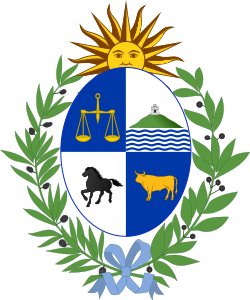Results
Under the electoral system in place at the time, each political party could have as many as three presidential candidates. The combined result of the votes for a party's candidates determined which party would control the executive branch, and whichever of the winning party's candidates finished in first place would be declared President.
The Batllista wing of the Colorado Party won 41 of the 53 Colorado seats in the Chamber, with the Liberty and Justice wing winning the other 12. [2] The Batllistas had similar success in the Senate, winning 12 of the 17 Colorado seats, while the 'To serve the country' wing won five. [3]
  |
|---|
| Party | Presidential candidate | Votes | % | Seats |
|---|
| Chamber | +/– | Senate | +/– |
|---|
| Colorado Party | Andrés Martínez Trueba | 161,262 | 19.57 | 53 | +6 | 17 | +2 |
| César Mayo Gutiérrez | 150,930 | 18.32 |
| Eduardo Blanco Acevedo | 120,949 | 14.68 |
| al lema | 313 | 0.04 |
| Total | 433,454 | 52.61 |
| National Party | Luis Alberto de Herrera | 253,077 | 30.72 | 31 | 0 | 10 | 0 |
| Salvador Estradé | 1,421 | 0.17 |
| al lema | 336 | 0.04 |
| Total | 254,834 | 30.93 |
| Independent National Party | Asdrúbal Delgado | 62,701 | 7.61 | 7 | –2 | 2 | –1 |
| Civic Union | Juan Vicente Chiarino | 36,100 | 4.38 | 4 | –1 | 1 | 0 |
| Communist Party | Eugenio Gómez | 19,026 | 2.31 | 2 | –3 | 0 | –1 |
| Socialist Party | Emilio Frugoni | 17,401 | 2.11 | 2 | 0 | 0 | 0 |
| Democratic Party | Elbio Rivero | 242 | 0.03 | 0 | 0 | 0 | 0 |
| Labor Concordance Party | Domingo Tortorelli | 38 | 0.00 | 0 | New | 0 | New |
| Liberal Party | Luis Strazzarino | 23 | 0.00 | 0 | New | 0 | New |
| Party for the Defence of Rights | Ramón Rodríguez Socas | 6 | 0.00 | 0 | New | 0 | New |
| Party of the People | Froilan Aguilar | 4 | 0.00 | 0 | New | 0 | New |
| Total | 823,829 | 100.00 | 99 | 0 | 30 | 0 |
|
| Registered voters/turnout | 1,168,206 | – | |
|---|
| Source: Instituto Factum [4] |
This page is based on this
Wikipedia article Text is available under the
CC BY-SA 4.0 license; additional terms may apply.
Images, videos and audio are available under their respective licenses.


